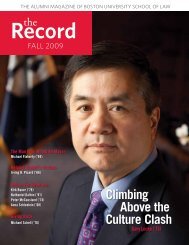the nature of representation: the cherokee right ... - Boston University
the nature of representation: the cherokee right ... - Boston University
the nature of representation: the cherokee right ... - Boston University
Create successful ePaper yourself
Turn your PDF publications into a flip-book with our unique Google optimized e-Paper software.
2005] THE NATURE OF REPRESENTATION 109<br />
reported <strong>the</strong> signing <strong>of</strong> <strong>the</strong> New Echota Treaty with even stronger language: “I have<br />
not time to give you any <strong>of</strong> <strong>the</strong> details <strong>of</strong> this arrangement, <strong>the</strong>y are so liberal as to<br />
give entire satisfaction to every Cherokee <strong>of</strong> all parties in <strong>the</strong> Nation, with whom I<br />
conversed, with very few exceptions.” 100<br />
Although <strong>the</strong> treaty terms were held up as liberal, <strong>the</strong> Treaty’s inability to garner<br />
full or even substantial support <strong>of</strong> <strong>the</strong> Cherokee people, forces <strong>the</strong> idea <strong>of</strong> <strong>the</strong><br />
treaty’s liberality to confront <strong>the</strong> dispute over Cherokee leadership. Ben Currey,<br />
<strong>the</strong> Superintendent <strong>of</strong> Cherokee removal, described <strong>the</strong> group that signed <strong>the</strong> Treaty<br />
as “that patriotic band headed by John Ridge, who were instrumental in eliciting<br />
from <strong>the</strong> Executive <strong>of</strong> <strong>the</strong> United States <strong>the</strong>se liberal terms.” 101 The authorized<br />
commissioner in <strong>the</strong> negotiations, John F. Schermerhorn, wrote in a journal during<br />
<strong>the</strong> negotiations at New Echota that he believed <strong>the</strong> Cherokee had no “way to save<br />
<strong>the</strong>mselves from degradation and final ruin, if not extirpation, but by accepting <strong>the</strong><br />
liberal overtures <strong>of</strong> <strong>the</strong> Government.” 102<br />
The Cherokees did not accept <strong>the</strong> “liberal overtures” as such without justifiable<br />
skepticism. Two years before <strong>the</strong> New Echota Treaty was signed, <strong>the</strong> editors <strong>of</strong> <strong>the</strong><br />
Cherokee newspaper, The Cherokee Phoenix, wrote:<br />
The Secretary <strong>the</strong>n speaks <strong>of</strong> <strong>the</strong> “liberal terms <strong>of</strong> <strong>the</strong> propositions, and are<br />
satisfactory to <strong>the</strong> American people, and would be so to <strong>the</strong> Cherokees were<br />
<strong>the</strong>y to exercise <strong>the</strong>ir own judgment.” Upon <strong>the</strong> admission <strong>of</strong> <strong>the</strong> people <strong>of</strong><br />
<strong>the</strong> U.S. to <strong>the</strong> benefits <strong>of</strong> <strong>the</strong>se propositions to <strong>the</strong> Cherokees were <strong>the</strong>y<br />
accepted, we shall render no objections. But before <strong>the</strong> government could<br />
supra note 45, at 181.<br />
100<br />
Letter from William. H. Underwood to Mr. Gath<strong>right</strong> (Jan. 1, 1836), in SOUTHERN<br />
BANNER, Jan. 14, 1836, at 2. The Federal Union newspaper includes fur<strong>the</strong>r description<br />
along a similar line <strong>of</strong> liberality: “[T]he agent <strong>of</strong> <strong>the</strong> Federal Government has received<br />
<strong>the</strong> assent <strong>of</strong> <strong>the</strong> Cherokees to a treaty, on <strong>the</strong> basis <strong>of</strong> that <strong>of</strong>fered to <strong>the</strong>m by <strong>the</strong><br />
president, during <strong>the</strong> last winter, with a few additional clauses for <strong>the</strong>ir benefit.”<br />
Cherokee Treaty, THE FEDERAL UNION, Jan. 15, 1836, at 3. Books with <strong>the</strong> proposed<br />
treaty “will be presented to <strong>the</strong> Cherokees, individually, for <strong>the</strong>ir assent, and sig<strong>nature</strong>;<br />
and as <strong>the</strong> terms are very favorable, it is believed that <strong>the</strong>y will be embraced by a very<br />
large proportion <strong>of</strong> <strong>the</strong> tribe.” Id. Of The Federal Union, <strong>the</strong>Cherokee Phoenix wrote:<br />
If <strong>the</strong>re has been a reaction in favor <strong>of</strong> a treaty, it must be found in <strong>the</strong> fiction <strong>of</strong> his<br />
own brain, we saw none in <strong>the</strong> Council. We have said heret<strong>of</strong>ore no truth can be<br />
found in <strong>the</strong>se Georgia papers on <strong>the</strong> Cherokee case, especially, in one that<br />
advocates <strong>the</strong> principles <strong>of</strong> a ROBBER.<br />
THE CHEROKEE PHOENIX, July 27, 1833, at 2.<br />
101 Letter from Ben Currey, Superintendent <strong>of</strong> Cherokee removal, to John Ross (Apr.<br />
19, 1835), in MEMORIAL AND PROTEST OF THE CHEROKEE NATION, 24th Cong., 1st Sess.,<br />
93. 102 A journal <strong>of</strong> <strong>the</strong> proceedings <strong>of</strong> <strong>the</strong> Council held at New Echota, Georgia Dec.21-<br />
30, 1835, with <strong>the</strong> Cherokee people by John F. Schermerhorn, Commissioner on <strong>the</strong> part<br />
<strong>of</strong> <strong>the</strong> United States to treat with <strong>the</strong> Cherokees east, in TREATY WITH THE CHEROKEE<br />
INDIANS, 24th Cong., 1st Sess., 20-27 at 22.









